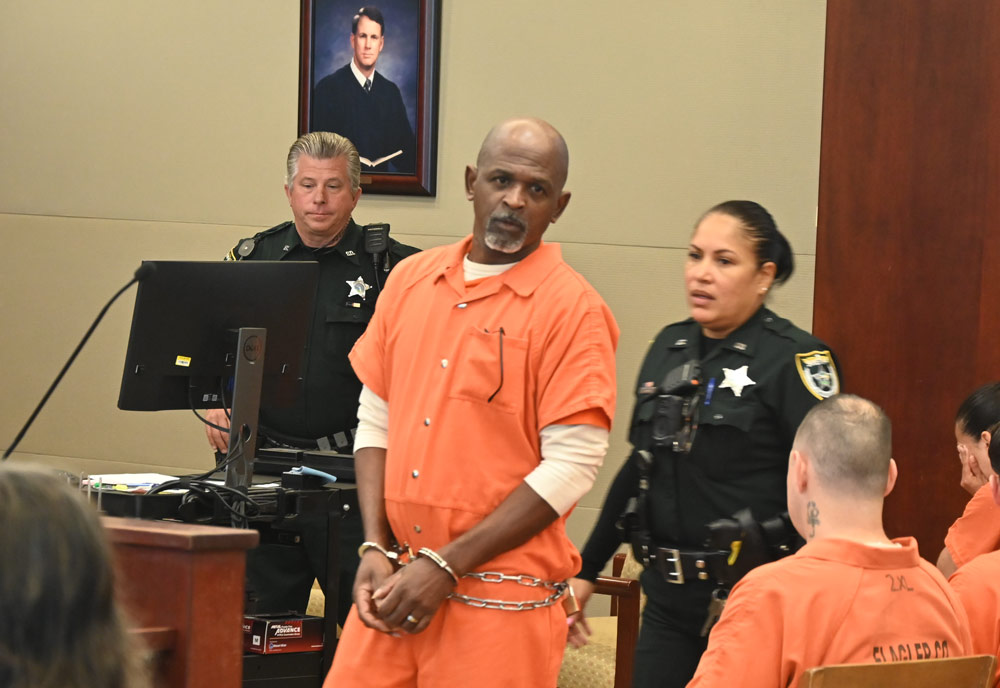
The death penalty case against Jermaine Williams, the 52-year-old Bunnell resident accused of stabbing his 50-year-old wife Yolonda Williams in the couple’s South Pine Street driveway last August, will not be tried until fall or perhaps next year, Assistant State Attorney Jason Lewis told the court today.
The defense told the court that numerous depositions have been conducted, and numerous depositions still remain. The prosecution and the defense have not discussed a plea. That remains a possibility, though anything less than life in prison is unlikely. Williams’s next pre-trial is scheduled for June 25.
“Ideally, if it’s going to go to trial, probably summer or winter of next year,” Lewis said. “We still have a lot of work to do.
Jermaine Williams was in court. So were almost a dozen family and friends of Yolonda Williams, all of them wearing white shirts imprinted with the leafy-tree emblem of the Yolonda Williams Foundation, established within weeks of the murder to raise awareness about and help stop domestic violence. Judges in the past have barred people attending court proceedings from wearing anything that may telegraph one message or another related to the case–at least when juries are involved. There are no juries in pre-trials.
Walking to the lectern for his segment of a long pre-trial session involving some 40 defendants, Williams ambled on slowly, looking intently at the gallery, even though bailiffs direct defendants not to do so. He did not address the court.
The defense this week filed 26 motions, all of them routine if substantial motions typically filed in death penalty trials. Several motions challenge the constitutionality of the death penalty, which is settled law federally, though the sentencing phase of death penalty trials in Florida has been in flux.
The Supreme Court and the Legislature have gone back and forth over admissible standards. For a few years after 2017, sentencing juries had to be unanimous in their recommendation for the death penalty. The Legislature reverted back to non-unanimous juries two years ago, which could yet be challenged on appeal, though so far the law has withstood challenge.
One motion seeks to bar execution by lethal injection. If convicted and sentenced to die, Williams could choose death by electric chair. That “choice,” such as it is, is offered Florida death row inmates. But “a choice of which cruel and unusual way to die is not a real choice,” the motion states without irony, though the prosecution is likely to point out the irony: Jermaine Williams, who stabbed his wife to death in front of one of their sons and in front of Jermaine’s father, and was captured on surveillance video doing so, gave Yolona no choice in her “cruel and unusual way to die.”
The motion nevertheless goes on to detail the grisly cases of botched execution, with the electric chair or with lethal injection. “Even in slight error in dosage or administration can leave a prisoner conscious but paralyzed while dying, a sentient witness to his or her own, slow, lingering asphyxiation,” the motion argues.
One motion seeks to compel the prosecution to produce written versions of the testimony of some of the witnesses impacted by Yolonda’s death, the so-called “victim impact witnesses.” In essence, the defense wants to know everything those witnesses will say before they’re on the stand so it can make its objections ahead of time, ostensibly to prevent disruptions during the testimony, in case a witness strays beyond the scope of what’s allowed to say. That would take away some of the immediacy of the testimony of victims the prosecution would rely on.
The defense also wants to exclude or limit victim impact evidence if it’s “extensive and or inflammatory,” and to exclude any evidence that would build sympathy for Yolonda Williams. “This type of evidence is not relevant to any issue in the guilty-not guilty phase. It is virtually always highly inflammatory and prejudicial,” the motion states, relying on solid precedent. Prosecutors know this, but generally find sly ways to elicit sympathy outside the motions parameters, with pictures or with seemingly innocuous testimony.
Williams is represented by Junior Barrett, a savvy attorney who represented Dorothy Singer in her 2018 trial for murdering her husband Charles in West Flagler in 2017 (she is serving life in prison). Barrett also represented Cornelius Baker in his successful commutation from death row to life in prison for the murder of Elizabeth Uptagrafft in Bunnell in 2007. Barrett is Chief Assistant Regional Counsel at the Office of Criminal Conflict and Civil Regional Counsel in the 5th District–in essence, a public defender.
Circuit Judge Margaret Hudson was sitting in for Circuit Judge Dawn Nichols today. Nichols is presiding over Troy Victorino’s and Jerone Hunter’s death-penalty sentencing in Volusia County. The two men face capital punishment in the so-called X-Box murders of six people in Deltona in August 2004.





























Dawn says
Why do they have a choice, as to how to die. Their Victim didn’t have a choice. All this time in lock-up, money wasted on food, and accommodations. He should have been put to death long ago. Save Money not time.
Bucktussle says
Dude has the nerve to be wearing a wedding band. Sociopath.
Wtf says
Still wearing his wedding ring, sick individual…
FlaglerLive says
Astute and telling observation we missed. Thank you.